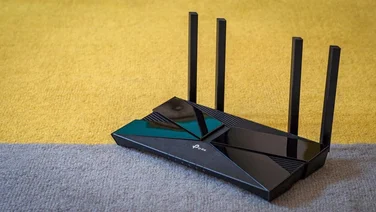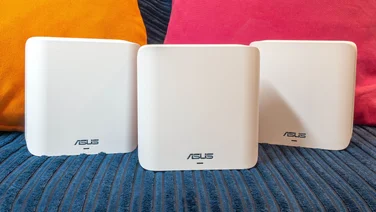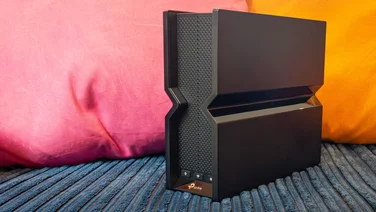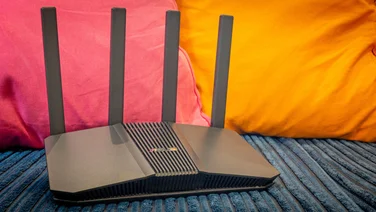To help us provide you with free impartial advice, we may earn a commission if you buy through links on our site. Learn more





- Great performance for the price
- Same features as the full-sized Orbi
- Slick management interface
- Only one Ethernet port
- Limited parental controls, unless you pay extra
We’ve long been fans of Netgear’s Orbi RBK50 mesh Wi-Fi extender system but, at £270, it’s pricey. You can save money by opting for the smaller RBK20 model but at £228 it’s still hardly an impulse buy.
Now, at last, there’s an Orbi system that sits squarely at the value end of the market. At £140 for a three-node kit, the Orbi Dual-Band nearly halves the price of the premium system, while retaining many of the same features.
READ NEXT: The best wireless routers to buy today
Netgear Orbi Dual-Band review: What you need to know
The Orbi Dual-Band is an 802.11ac wireless mesh system, which does the same basic job as the full-sized Orbi (and indeed pretty much every other mesh kit out there). Notably, it runs almost exactly the same firmware as the other Orbi models, which means you get quite an extensive set of features.
There are some key differences, however. One is that the nodes are smaller and more compact than those of other Orbi models, and the system claims a smaller coverage area of 300m², compared to the standard model’s 560m².
Another is that, while most Orbi systems operate simultaneously across three radio bands, the Orbi Dual-Band supports only two. This certainly helps cut the cost but it also means your wireless devices have to share bandwidth with backhaul traffic on a single 5GHz connection, ensuring that you won’t see the heights of performance achievable by more expensive mesh gear.
Netgear Orbi Dual-Band review: Price and competition
At £140 for a three-node system, the Orbi Dual-Band is competitively priced and, if you only want two nodes, the price falls to just £108.
There are several rivals out there that don’t cost much more, however. A twin pack of the Linksys Velop Dual-Band can now be had for £121, while the TP-Link Deco M5 is a mere £150. Stretch to £180 and you can get the BT Whole Home Wi-Fi extender system, which delivered excellent results in our tests.
Here’s a list of those alternatives and where to buy them:
- Linksys Velop Dual-Band: £121, twin – Buy from Amazon
- TP-Link Deco M5: £150, triple – Buy from Amazon
- BT Whole Home Wi-Fi: £180, triple – Buy from Amazon
- D-Link Covr C1203: £116, triple – Buy from Amazon
- Tenda Nova MW6: £140, triple – Buy from Amazon
Netgear Orbi Dual-Band review: Design and features
The Orbi Dual-Band units don’t look like other Orbi nodes: they’re squat and square, with little moguls on top. At the front, a pinprick LED glows in various colours to indicate status and error conditions. The design feels a little plain and boxy but with a footprint of just 105cm², the units are unobtrusive enough.
As well as being smaller than other Orbi models, the Dual-Band variant is far less generously equipped with wired connections. While the full-fat Orbi offers four Gigabit Ethernet sockets per node, here there’s just one connector on the router unit (aside from the one that connects to your modem), and no Ethernet at all on the satellites. USB is entirely absent, too, although each unit does retain the small Sync button that lets you easily connect devices via WPS.
The good news is that the software has barely been cut down at all. Whether you’re using the Orbi smartphone app or the slick and responsive web portal, very nearly all the key features of the RBK50 are reproduced here: all that’s missing, for obvious reasons, are the options for USB file and printer sharing.





This means you get a built-in VPN server for securely accessing your home network over the internet, along with support for basic voice controls via both Alexa and the Google Assistant. You also get the option of subscribing to Netgear’s Armor security service, which for $70 a year gets you network-level virus detection and security monitoring for all the devices in your home.
Separately, you can sign up to the Circle parental controls service too, which for $50 a year gives you extensive control over time-limits and schedules for kids’ devices, along with a breakdown of their internet usage. The catch is that the free parental controls provided for non-subscribers are very limited, with no device-specific scheduling options at all.
Netgear Orbi Dual-Band review: Performance
Inside, the Orbi Dual-Band is equipped with a respectable set of Wi-Fi hardware, with a 5GHz radio that’s rated at 866MBits/sec – the same speed as the client radio on the premium version – and support for 2×2 MU-MIMO. However, as we’ve noted, that radio has to carry a lot more traffic than on the RBK50, leaving less bandwidth for your devices.

To measure performance, I carried out my usual test, setting up the Orbi’s router node in my living room, situating the other two nodes in adjacent rooms, then walking around with a Microsoft Surface Laptop measuring the average upload and download speed to a NAS appliance connected to the Orbi router unit by Ethernet in a few specific locations. Here’s what I saw, along with results from the same test carried out with the Orbi RBK50, plus the Dual-Band’s major rivals in the same price range:

The Orbi Dual-Band had no problem delivering a strong wireless signal to the furthest extents of my home but, as expected, it couldn’t keep pace with the tri-band edition. Although the Dual-Band surprisingly bested the RBK50 at short range, across the rest of the house it delivered downloads at around half the speed, and fell almost as short in the upload tests.
Even so, within its price bracket, the Orbi Dual-Band does very well. It outpaced the D-Link and Tenda systems in every test, and while it was a whisker behind the TP-Link Deco M5 in two of our download tests, it pulled convincingly ahead in the other two, confirming the Orbi Dual-Band as a stronger performer overall.
READ NEXT: The best wireless routers to buy today
Netgear Orbi Dual-Band review: Verdict
The Orbi Dual-Band is a significant step down from the flagship model. Performance doesn’t come close, and it’s much less well equipped with physical connections.
Does that mean it’s a dud? Absolutely not. It’s fast enough to distribute the full bandwidth of a 100Mbits/sec fibre connection all around your home, which means it’ll eat up jobs like 4K video streaming with headroom to spare. And if you need additional Ethernet sockets, you can add an external switch (such as this one) for under £20.
There are reasons to pay the extra for a tri-band mesh extender. If you move a lot of data around inside your LAN, you’ll appreciate the extra speed. And parents might well prefer to look for a system that comes with scheduling built-in, rather than expecting you to pay extra.
For many households, however, the Orbi Dual-Band will strike the perfect balance. It’ll give you a strong, respectably speedy wireless signal around your home, with a strong set of networking features and management options, and it doesn’t hurt at all that it’s one of the cheapest mesh systems around.








